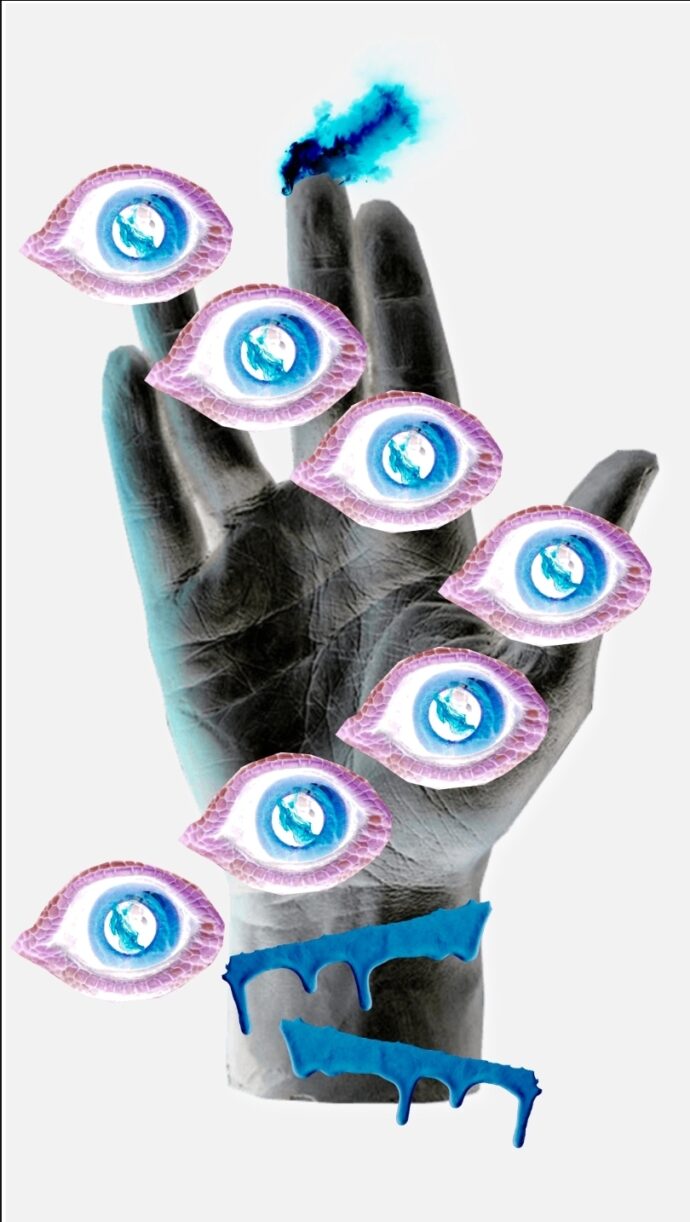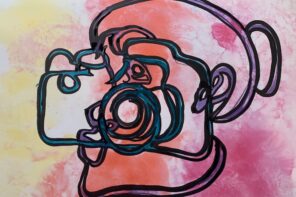When shame comes over wearing a metallic slip and black-ringed liner, the first thing she does is ask you to notch each divot in her spine with your knuckle. She runs a ringed hand down your back and smiles at you like you’ve answered a rhetorical question. You’d called shame earlier to ask that she give you some time to prepare for her, begged her to respect your schedule, your accordion to-do list. Your ungraded essays and unwritten seminar papers, the brunch shift you work tomorrow at your second job. The workout regimen you hate but try to maintain for these little reunions of yours. You forgot that shame speaks in tongues, that her ears live in her throat. Besides, you know: shame is always early. When shame comes over, make sure you’ve pulled out the maroon futon you spilled grape juice on as so many times a child, the one your parents kept for ten years, the one they prided on replacing with a beige sectional after they finally paid off their credit card debt. Turn on the string lights. Pin blue blankets over the foyer and spread furred pillows over the wood floors of your rented apartment so when shame looks up, she can imagine herself on the hillside of your childhood pulling centipede grass, willow tree switching in the wind, watching clouds in that pocket of time before you discovered that knowing yourself was an act. A ritual dipping—your hands in that shallow creek bed running beneath the bridge by your house, watching the water strain between your fingers. When shame comes over, she brings her own sheets and it hurts your feelings every time. You ask shame to put something on the big screen, but she’s no help picking movies. You browse options you think she will appreciate—Magnolia, Black Swan, Amelie—and she hums until you concede to home videos kept in the back of your closet. You deflect with a Negroni, shame’s favorite drink, and she screeches in delight, demands you pour yourself a double. When shame comes over, it’s always an event. Shame wants you to paint her toes with green glitter polish. She wants goose-down pillows, matching silk pajama sets you wish you could afford. She wants Australian licorice, the strawberry kind. She wants to play Battleship but is a very sore loser. Shame doesn’t want company, so don’t even ask. Instead, feed her. Serve her a silver tray lined with soft triangles of camembert and aged gouda and glass saucers of Calabrian chiles in oil the way your best friend back home taught you. Offer her hand-rolled flatbread dusted with parmesan and fresh basil, sweet potato gnocchi you pressed by hand with the only fork you own. Don’t mention the friends you haven’t seen in months a thousand miles away from Oklahoma, replacing the carpet and toilets in their homes like real adults with salaried paychecks. Don’t mention your growing kid sisters adopting kittens, smoking too much weed, decorating their elementary school classrooms with yellow papier-mâché moons. Your mother, texting you photos of sun-swollen zucchinis and tomatoes that she’s harvested from her West Virginia garden. Your father, sending you copies of updated car insurance cards—all evidence of how much you miss, how much you still need. Shame decides she wants to get messy. She wants to shake her ass to The Avalanches and Grimes, to watch YouTube tutorials on decluttering the home and start with you. Shame is a lightweight, but considers herself a tank. A vault. A bottomless pit. You appreciate shame’s lack of self-awareness. After two lime Jello shots, she slurs I think we’re trauma bonded. She pouts when you don’t laugh. You don a polka-dotted paper hat and blow a tufted party horn against her neck and she forgets your sin. She wants to give you a makeover. Don’t bother arguing—you deserve it. She tears your cuticles until they bleed, braids your hair so tight it gives you a headache. You remember your grandmother’s hands moving across your scalp, yanking, the way cigarette smoke caught light in an open window, her Dollar Tree gifts you ripped open with disappointment, the way she hissed, Ungrateful. Shame dots your nose with red eyeshadow and paints your lips black and white. She draws a teardrop beneath your eyeline and cackles when you hold a mirror to yourself. Shame is a good amateur comedian. Are you hungry? you ask shame. No, she tells you. But I could eat. You hit a drive-thru at midnight, order Oreo milkshakes and tater tots and fried pickles and Diet Cokes for chasers when you get home. You careen through residential neighborhoods—past mom-and-pop body shops, past boarded-up mailrooms, past paint-chipped arthritic duplexes sighing in the night. You close your eyes and imagine grazing deer, a veil of deciduous trees draping pot-holed one-lanes back in the mountains—a place where you could only be found if someone was really looking. Before you get home, you go to toss your greasy paper bags in the dumpster a street down from your apartment and shame screams at you. Leave them, she says. She doesn’t have to yell; you’ve hung onto her every word for as long as you can remember. Sometimes, shame forgets she’s not the only one there. When you go inside, shame sticks her fingers down your throat and asks you to hold her hair while she pukes. Shame wants to make you feel good, but keeps conflating pure with empty. You start to say I hate you, but gag. You can’t lie to shame. You need her. The two of you wash your faces above your porcelain sink and she says, Bitch, when’s the last time you bleached this? You slap a charcoal face peel on her cheeks and remind her We have beer in the fridge! Shame grins and black clay drips into the ridges of her teeth. You squat in front of your cheap entertainment center while your cat pisses in a corner. Shame pulls up a chair. She wants to call all your childhood girl friends and confess your once-crushes. She wants to tell your father you’ve invited men who didn’t care about you into your bedroom. She wants to tell your eager, empty-nest mother that sometimes you pity her. She wants to tell your sisters you had the option to write them and chose to lay in bed and google black-and-white tattoo ideas instead. She wants you to finally visit the grave of your grandmother, lay against the cool tombstone, and learn the ways that girls learn that they have become what they have always been told they are: through touchless touch. Shame wants you to stop fucking around and play those damn home videos. Your hands shake as you slide the VHS in. It might not work, you stutter. Shame puts her head on on your shoulder. Try. You start telling her about how the world was once green and honey golden. How you once skirted your palm along the floodwaters that surrounded your house from the safety of a kayak, your parents behind you. How you watched kittens tumble out of your old barn, how the dull thud of your father dropping steel weights into the earth while the sun dipped behind the hills sounded like comfort. How your sister’s breath as a child smelled like sour milk as she stood before you while you smoothed pink eyeshadow over her eyelids before you threw your parents a dance concert. Shame mimes yawning and you struggle to remember just what it was you were telling her about. She grabs the remote from you and presses play. The hair on your arms raise. The room grows hot and muggy; a greenhouse of unfinished business, unspent feelings. Your stomach contracts and you’re suddenly aware of how much you’re holding in your body, how much you’ve asked it to take. The grainy image crackles and fades to gray static that runs and runs. Shame’s jaw extends, her mouth a purple O. The TV burps and gasps, the sound trickling from behind shame’s teeth. She pulls a thread from her throat as white noise fills the room—a bobbin unspooling—and you instinctively touch the quilt your mother sewed you before you moved to the Southwest, away from her, from everything you ever knew to be true. Shame wraps the thread around both of your ring fingers and dusts the bangs from your eyes. You don’t know when you started crying, but she licks your blotted tears off her fingertips. Lay with me, she tells you. You follow her to the floor. The paused TV glow turns both your skin lychee pink. Shame stretches her arms above her head. You smooth her hair behind her. It looks like she’s falling into a warm blue hole from a peaked rock. Like she’s hanging upside down the way you were always afraid to growing up—like she trusts that the world beneath her will not break her. Like she’s dangling from the backseat window of a beat-up Camry as it shoots out WV back roads mid-autumn, pop-synth blaring from the radio, wondering at poplar leaves curling into themselves as a means of surviving the inevitable. You look away.
Amanda Gaines is an Appalachian writer and PhD candidate in creative nonfiction in Oklahoma State University’s creative writing program. Her poetry and nonfiction are published or awaiting publication in Barrelhouse, Willow Springs Magazine, Yemassee Journal, Redivider, New Orleans Review, Southeast Review, The Southern Review, Juked, Rattle, Pleiades Magazine, SmokeLong Quarterly, Ninth Letter, and Superstition Review.


